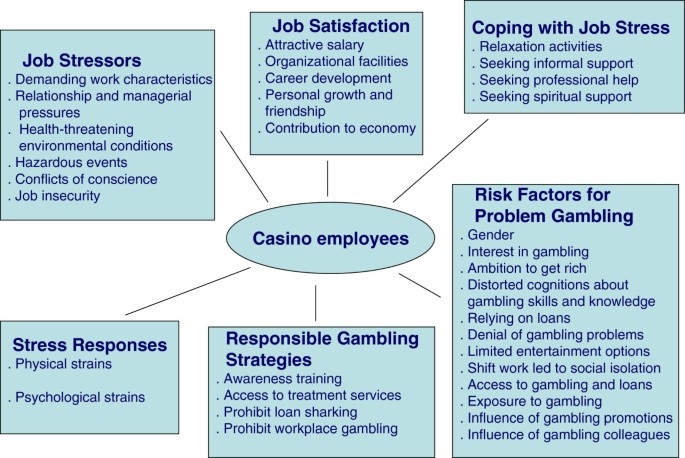Gambling Policy In The Workplace
To sum up, we recommend a workplace gambling policy and programmes that adopt a supportive approach and focuses on health promotion and prevention, education and harm reduction strategies. The gambling policy also should be coordinated with the organization’s discipline program, carving out specific behaviors that are subject to discipline and termination. Game over Allowing gambling at work — by virtue of not having a policy, not enforcing the policy, promoting gambling, or just ignoring it — leaves an organization open to. Information about creating a workplace gambling policy, including useful tips and a sample policy. Additional resources about gambling in the workplace, workplace problem gambling symptoms, and a 21-step system to help employees recover from gambling addiction.
With March Madness coming up, you might have been invited to join an office pool — maybe a toonie buy-in, or something a little bigger, pricier, and more competitive. This is nothing new: from co-workers betting on big games to staff members checking out poker websites on their lunch break, gambling can be a surprisingly pervasive part of the workplace.
In fact, one workplace survey cited by the Toronto-based Centre for Addiction and Mental Health found nearly 60 per cent of respondents said employees at their organizations have been involved in Super Bowl pools, with 39 per cent saying people at their office pooled money to buy lottery tickets.
But is allowing (and participating) in this kind of activity at the office a bit of a gamble? It can, after all, be a bit of a slippery slope. To protect yourself (and your employees), it might be time to implement a gambling policy.
Here are some reasons for and against.
Pros and cons of workplace gambling
Before you prohibit all the aforementioned forms of “gambling,” keep in mind that these group activities can actually be a benefit to staff and company morale.
“If the stakes are really low, and it’s more about instilling some competitive spirit in the team, I don’t see much harm in that,” says Eric MacIntosh, an associate professor of sport management at the University of Ottawa. “People should have a little fun at work, and something like an office pool can be a way to have that fun and bond with co-workers.”
But before you call a company-wide hockey pool for the upcoming playoffs, keep in mind that you might alienate those who don’t want to participate (or, in this case, those who don’t know anything about sports).
“What if you’ve got 20 people in the office, and 15 want to be part of this office pool, and five don’t?” MacIntosh asks. “Does that make those five people a subculture in the organization?”
Chris Higgins, professor emeritus at Ivey Business School, echoes MacIntosh’s sentiment that a little office pool is generally harmless fun, but cautions to also be on the lookout for signs of trouble. “The real problem,” Higgins says, “is people spending time on gambling websites — be it online poker or sports betting — at the office. That can lead to a drop in someone’s productivity and could be a red flag for bigger issues, like gambling addiction,” he says.

According to the Centre for Additional and Mental Health (CAMH), employees with legitimate gambling problems may also be experiencing other mental and physical health issues such as depression, anxiety, lack of sleep, or stress-related illnesses.
Why gambling policies are helpful
When it comes to online gambling, Higgins says the answer is simple: Don’t allow it.
“I would restrict access to gambling sites … turn the switches off,” he says, adding most companies already block these types of websites.
As for office pools and friendly bets among coworkers, MacIntosh says there should be a “clearly articulated” set of parameters in a formal document to guard against potential problems. So what would that kind of policy entail? According to CAMH, they should focus on harm reduction and providing supports, and require backing from top levels of management.
The mental health centre also recommends blocking gambling sites, keeping accurate records on workplace performance, including gambling information in financial services for employees, and organizing social events at places other than casinos or racetracks.
Looking for more information on office gambling? Check out CAMH’s ‘Gambling and the Workplace’ resource online.

See also:
4 (free!) ways to boost employee engagement
How to build a healthier, happier office
_______
– Subscribe to the Hiring Insider newsletter
– Follow Workopolis_Hire on Twitter
– Listen to Safe for Work, the Workopolis podcast
– Post a job on Workopolis now
Who doesn’t love a little friendly competition at the office when it comes to March Madness® and other sporting events? But did you know that those office pools could be breaking the law?
Sports betting: A numbers game
According to the American Gaming Association, 40 million Americans fill out more than 70 million brackets and wager more than $2 billion on a winning March Madness entry. NCAA tournament fans enjoy competing in office pools with their coworkers — and the added excitement and camaraderie that goes with it, much like what happens when a jackpot for winning a lottery grows to astronomical numbers.
Whether you base your office pool decisions on careful team analysis and in-depth player statistics or just an eccentric college team nickname, you get to pick the teams you think will make it all the way to the championship —and win. After each game, you get to find out which of your colleagues’ teams were knocked out of the running. It’s fun to place small, and usually friendly, wagers on what’s widely known as The Big Dance®. But does it count as illegal gambling?
Did you know about these gambling laws?

Given that millions of Americans place bets on NCAA brackets each year, the jury is still out regarding the percentage of those people who have actually been arrested or fined for participating in an office pool. Yet if you create a tournament bracket for March Madness or any other sporting event, you could be violating federal, state or local laws that ban workplace gambling of any kind.
Gambling laws vary by state, but the most common violation of federal law involves the violation of the Professional and Amateur Sports Protection Act (PASPA) of 1992. PASPA prohibits sports gambling in every state except four: Delaware, Montana, Nevada and Oregon. This federal law does not create an exemption for NCAA office pools.
In addition, many states have laws that prohibit gambling, with exceptions that may include casinos, state lotteries and horse racing. Some states allow recreational betting up to a certain dollar amount as long as the participants are within the same state and the organizer does not take a cut of the money. In states that allow social gambling, the participants must have an established social interest outside of gambling.
But the issue may get stickier if people from multiple states are placing bets or if people are wagering large amounts of money. These behaviors may draw scrutiny from regulators and put you at greater risk of prosecution. Additionally, if anybody is at heightened risk for getting prosecuted under current gambling laws for involvement in NCAA pools, those individuals collecting and paying out prize money seem to be in the most dangerous position.
Consider potential employer concerns with office pools.
Before you take the plunge in the office betting pool, review your office policies to make sure you won’t suffer adverse employment consequences if you make place bets with your coworkers.
For example, to protect itself from liability, your workplace may establish policies prohibiting employees from participating in recreational gambling, including betting on the NCAA basketball tournament. To avoid getting in trouble with human resources, you should familiarize yourself with your company’s policies before you create an office pool or tournament bracket.
Although office pools can deliver a boost in team morale to the workplace, companies can have a number of legitimate concerns:
- Liability. In most states, office pools are considered illegal gambling. Therefore, allowing employees to participate could potentially subject the employer to legal action and serious penalties.
- Productivity. Although March Madness or team excitement may boost employee morale, it can lead to a drop in worker productivity.
- Use of company resources. Workplaces generally frown on their employees using company resources for non-work activities.
- Non-participants. Sports are a popular pastime for many Americans, but not everyone is a fan. Further, many Americans are opposed to gambling. Allowing recreational gambling in the workplace may cause some employees to feel uncomfortable and file complaints.
You should be particularly careful if you intend to organize an office pool, as your employer may have polices against workplace gambling. This policy could include guidelines that help determine:
- Whether gambling of any type is allowed in the office.
- How to get HR approval for gambling activities.
- Any limits or restrictions on what type of company equipment can and cannot be used to engage in the gambling activity.
- A complaint reporting procedure.
- Types of discipline that may be expected for employees who violate the company’s workplace gambling policy.
Review your company’s policies on workplace gambling. To reduce the risk of getting in trouble, consult with your boss or your HR department before inviting your coworkers to create a basketball bracket. One alternative is to limit conversations about the NCAA tournament to off-work hours and lunch breaks.
Gambling Policy In The Workplace Definition
Will I get in trouble if I enter an office pool?
If you’re placing bets on a sports tournament, you’re probably violating federal law unless you’re in Nevada or one of the other three states that are exempted from PASPA. If you’re organizing a pool, you should be aware of the betting laws in your state and make sure that your place of employment is okay with you organizing a pool.
If you try to be devious and you get caught, you may find yourself in trouble with your boss, especially if your company has clear rules against workplace betting. You’ll especially want to be careful about the method in which the money is handled and make sure you don’t take in any profits.
Gambling Policy In The Workplace Organization
To keep your employer satisfied, keep the amount of time you spend on tournament-related activities to a minimum while you’re on the clock. Or consider alternatives to the office betting pool, such as asking your company to sponsor an event where the winner gets a year’s worth of bragging rights, a pizza party or a donation to a charity of the winner’s choice.



